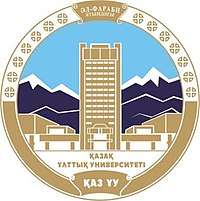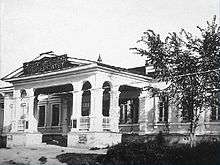Al-Farabi Kazakh National University
Al-Farabi Kazakh National University (Kazakh: Ál-Farabı atyndaǵy Qazaq Ulttyq Ýnıversıteti), also called KazGU or KazNU, is a university in Almaty, Kazakhstan. Named after the Eastern philosopher and scholar al-Farabi, it is one of the country's largest universities.
Ál-Farabı atyndaǵy Qazaq Ulttyq Ýnıversıteti | |
 | |
| Type | National |
|---|---|
| Established | 1934 |
| Rector | Mutanov Galimkair Mutanovich |
| Students | 20,000 |
| Undergraduates | 16,000 |
| Postgraduates | 4,000 |
| Address | Al-Farabi Avenue, 71 , , |
| Campus | urban |
| Website | www.kaznu.kz |
KazNU is the oldest classical university of the Republic established by a Decree of the Kazakh Regional Committee (KRC) office dated November 13, 1933. One year after Kazakhstan's 1990 declaration of independence, the name was changed to Al-Farabi Kazakh State University. According to the QS World University Rankings KazNU takes 207th place in the rating of the best universities of the world.
In 2001, the government classified it as a "national" university. More than 20,000 students, post-graduates and PhD students study at KazNU, and there are more than 2500 faculty members working at KazNU, including 400 doctors of science, professors and more than 800 candidates of science and associate professors. Like other universities founded under the Soviet system, it is highly centralized.
Campus
The university has its own campus, so-called "Kazgugrad", on land between Timiryazev Street, Al-Farabi Avenue, the "Yessentai" ("Vesnovka") river, and the Botanical Garden. The main building (GUK) is 15 stories tall and hosts the university administration as well as the History, Economics, Law, Philology and Journalism departments.
Al-Farabi Kazakh National University has the largest campus in Kazakhstan with an area of 100 hectares, in one of the most beautiful areas of Almaty. The education infrastructure of the campus consists of 13 education buildings with a total area of 165,000 m² and scientific laboratories with a total area of 18,940 m².
There are seventeen dormitories on campus and four more departments: Philosopy and Political Science, Oriental Studies, Preparatory and International Relations in the second, smaller campus located at the intersection of Karasay Batyr - Masanchi streets.
The departments of Physics, Mechanics-Mathematics, and Chemistry were formerly in the second campus; in 2011 they moved to newly constructed buildings on the first.
History

January 15, 1934, is the day of the official opening of Kazakh State University, which was established at the basis of the Pedagogical Institute by the decree of the Council of Peoples’ Commissars of USSR and VKPb Kazakh regional committee. On December 2 of the same year KazSU was named after the famous Soviet party and state leader S.M. Kirov.
In January 1934, the first entrance exams at the faculties of Biology, Physics and Mathematics were held; in September they were held at the Faculty of Chemistry. In 1937, the first Faculty of Humanities – the Faculty of Foreign Languages was established; a year later, the Faculty of Philology. In May 1941, as a result of joining with the University of the Kazakh Communist Institute of Journalism, the Faculty of Journalism was established.
After the severe years of war, new faculties began to open. In August 1947, the Faculty of Geography was established and, in 1949, the faculties of Philosophy and Economics. As a result of the joining with the Alma-Ata Institute of Law in 1955, the Faculty of Law was established.
During the same period a strong scientific educational and methodological base emerged at the university. By the mid-1980s there were 98 departments, 43 scientific research laboratories and 9 scientific research groups at KazSU. The faculty staff consisted of 1180 people; among the faculty staff there were 30 academicians and AS KazSSR correspondent members, more than 100 doctors, professors, more than 600 science candidates, lecturers. Human resources were trained on 21 specialties and 74 specializations.
Smart City program
Al-Farabi KazNU opened in 2019 a Two-Diploma Innovative Specialists Training Program - "Smart City." The university is also a member of the "Smart City" International Consortium of Universities. Together with the Universities of the European Union Al-Farabi develops the Master's Program in "Information Technologies for the Smart City" under the "ERASMUS +" project.[1]
Faculties
- Faculty of Mechanics and Mathematics
- Faculty of Chemistry and Chemical Technology
- Faculty of Physics and Technologies
- Faculty of Informational Technology[2]
- Faculty of Biology and Biotechnology
- Faculty of Geography and Environmental Sciences
- Faculty of History, Archeology and Ethnology
- Faculty of Philology and World Languages
- Faculty of Journalism
- Faculty of International Relations
- Oriental Studies Faculty
- Faculty of Philosophy and Political Science
- High school of economics and business
- Law Faculty
- Preparatory Faculty for Foreign Students
- Higher school of medicine
Research Institutes
The university also has research institutes:
- Institute of State and Law
- Research Institute of Experimental and Theoretical Physics (RI of ETF)
- Research Institute of New Chemical Technologies and Materials (RI of NCTM)
- Center of Physical and Chemical Methods of Research and Analysis (CPCMA)
- Research Institute of Biology and Biotechnology (RI of BB)
- Institute for Advanced Studies (IAS)
- Confucius Institute
- Science and Technology Park (Technopark)
- National Open Nanotechnology Laboratory (NONL)
Rankings
| University rankings | |
|---|---|
| Global – Overall | |
| QS World[3] | 165 (2021) |
Al-Farabi Kazakh National University was ranked 18th among countries of the emerging Europe and central Asia region in QS EECA University Rankings of 2020 [4] and 207th worldwide according to the QS World University Rankings in 2020.[5]
Partner universities







Notable alumni
- Kairat Abdrakhmanov, Kazakhstan's Minister of Foreign Affairs
- Murat Aitkhozhin, President of Kazakhstan Academy of Sciences
- Yerik Asanbayev, former Vice-President of Kazakhstan
- Kanat Auyesbay, Kazakh newsreader
- Oralkhan Bokeev, Kazakh writer
- Gulzhana Karagusova, Kazakhstan's Minister of Social Justice
- Abish Kekilbayev, Chairman of the Republic of Kazakhstan Supreme Soviet, and Secretary of State of Kazakhstan
- German Kim, head of the Department of Korean Studies and one of the leading internationally recognised scholars of the Koryo-saram
- Michał Łabenda, Polish ambassador to Azerbaijan, Mongolia and Egypt
- Mukhtar Magauin, Kazakh writer and publicist
- Fuat Mansurov, Kazakh mathematician and conductor
- Gulzhan Moldazhanova, Kazakh businesswoman
- Maksut Narikbaev, Chairman of the Supreme Court of Kazakhstan
- Oleg Novachuk, Kazakh businessman, currently Chief Executive of Kazakhmys
- Abdizhamil Nurpeisov, Kazakh poet and writer
- Gulnara Sarsenova, Kazakh film producer
- Kanat Saudabayev, Kazakhstan's former Secretary of State and Minister of Foreign Affairs
- Olzhas Suleimenov, former Speaker of Kazakhstan's parliament and poet
- Yessengaly Raushanov, Kazakh writer and poet.
- Igor Rogov, head of the Constitutional Council
- Tauman Torekhanov, Kazakh journalist, editor and writer
- Zhanseit Tuimebayev, Kazakhstan's former Minister of Education and former ambassador to Russia
- Bakhytzhan Zhumagulov, Kazakhstan's Minister of Education
References
- "KazNU to train specialists for Smart City".
- https://www.kaznu.kz/en/19202/page/. Missing or empty
|title=(help) - [QS ranking 2021 https://www.topuniversities.com/university-rankings/world-university-rankings/2021]
- Quacquarelli Symonds. "QS EECA University Rankings 2020". QS EECA University Rankings 2020.
- Quacquarelli Symonds. "QS World University Rankings 2020". Quacquarelli Symonds.
External links
- Official homepage
- Official homepage (in Kazakh)
- Official homepage (in Russian)